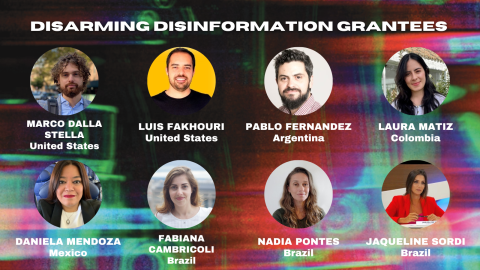
Eight reporting teams from 11 countries will receive up to $10,000 each in grants and expert mentorship to support cross-border investigations into the people and organizations funding disinformation campaigns in the Americas. The winning projects will investigate, among other topics, who is behind and who profits from false narratives targeting Latin American migrants at the U.S. border; who funds disinformation about abortion and women's rights in the Americas; and who invested in anti-democratic falsehoods that led to the January 8th attacks in Brazil.
The International Center for Journalists (ICFJ) announced the winners at the International Symposium on Online Journalism (ISOJ) in Austin, Texas, after a 48-hour “Investigathon.”
“The winning teams will reveal who is paying for disinformation that is undermining democracy and endangering lives across the hemisphere,” said ICFJ Senior Program Director Cristina Tardáguila. “To fight this scourge, we need to unmask the people behind it.”
The grant recipients are among 19 collaborative teams – made up of 40 journalists, news outlets, universities and tech companies – that participated in the Investigathon. The investigations are expected to be published by June 2023.
The grants are part of Disarming Disinformation, a three-year program run by ICFJ with lead funding from the Scripps Howard Foundation, an affiliate organization of the Scripps Howard Fund, which supports The E.W. Scripps Company’s charitable efforts. The Brazilian nonprofit Serrapilheira Institute is supporting three of the projects on scientific disinformation in Brazil.
At the Investigathon, the teams worked with mentors and each other to develop strong working plans for their investigations. They shared information regarding sources, databases and tools. The group discussed ways to better track money transactions, online connections and social media networks. They attended sessions designed to help them conduct investigations safely, without leaving a digital footprint. Other journalists interested in combating mis/disinformation can access Disarming Disinformation resources on the International Journalism Network’s (IJNet) site.
Disarming Disinformation trainers and mentors Patricia Campos Mello of Folha de S.Paulo, Duke University’s Christopher Guess, Giannina Segnini from Columbia Journalism School, Pro Publica’s Craig Silverman, Claire Wardle of Brown University and ICFJ Disinformation Fellow Laura Zommer selected the grant winners. Read more about each winning project below.
Scripps Howard Fund grants:
- The team led by Luis Fakhouri (Palver, United States) will investigate organized groups behind the January 8th, 2023, Congress attack in Brazil.
Partners: Agência Lupa (Brazil), Televisa Univision (United States)
- The team led by Pablo Fernández (Chequeado, Argentina) will investigate groups that spread disinformation about gender issues such as abortion, gender identity and sex education in Latin America. They will look into whether or not their actions are coordinated and/or receive funding from religious organizations in the United States.
Partners: La Silla Vacia (Colombia), Ojo Público (Peru), Ocote (Guatemala), El Surti (Paraguay), KUT/NPR (United States)
- The team led by Laura Sofía Matiz (La Silla Vacía, Colombia) will examine who funds digital marketing agencies to coordinate disinformation campaigns in Telegram groups about political candidates in Colombia, Mexico and Chile.
Partners: Animal Político (Mexico), Mala Espina (Chile)
- The team led by Daniela Mendoza (Verificado MX, Mexico) will investigate who finances disinformation targeted at Latin American migrants trying to cross the United States border.
Partners: Conexión Migrante (United States), Associated Press (United States)
- The team led by Marco Dalla Stella (Columbia Journalism School, United States) does not wish to share any details about their investigation for safety reasons.
Partners: Centro Latinoamericano de Investigación Periodística (Costa Rica)
Serrapilheira grants:
- The team led by Fabiana Cambricoli de Souza (O Estado de S. Paulo, Brazil) will investigate individuals and organizations that fund doctors who spread disinformation in Brazil.
Partners: Ciência Suja Podcast (Brazil), Brasil.IO (Brazil)
- The team led by Nadia Pontes (Deutsche Welle, Brazil) does not wish to share any details about their investigation for safety reasons.
Partners: Deutsche Welle Brasil (Germany), Ambiental Media (Brazil), Unicamp (Brazil), Universidade Federal de Campina Grande (Brazil)
- The team led by Jaqueline Sordi (Revista Questão de Ciência, Brazil) does not wish to share any details about their investigation for safety reasons.
Partners: Veja Saúde (Brazil)
Disarming Disinformation is run by ICFJ with lead funding from the Scripps Howard Foundation, an affiliate organization of the Scripps Howard Fund, which supports The E.W. Scripps Company’s charitable efforts. The three-year project will empower journalists and journalism students to fight disinformation.